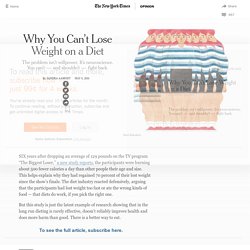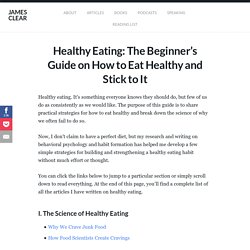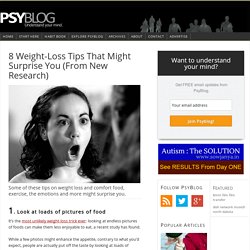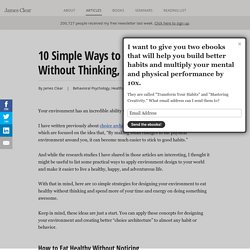

5 Reasons Why We Eat More Than We Realize. 10 Ways Your Brain Keeps You From Maintaining Healthy Weight. Why You Can’t Lose Weight on a Diet. SIX years after dropping an average of 129 pounds on the TV program “The Biggest Loser,” a new study reports, the participants were burning about 500 fewer calories a day than other people their age and size.

This helps explain why they had regained 70 percent of their lost weight since the show’s finale. The diet industry reacted defensively, arguing that the participants had lost weight too fast or ate the wrong kinds of food — that diets do work, if you pick the right one. But this study is just the latest example of research showing that in the long run dieting is rarely effective, doesn’t reliably improve health and does more harm than good. There is a better way to eat. The root of the problem is not willpower but neuroscience. The brain’s weight-regulation system considers your set point to be the correct weight for you, whether or not your doctor agrees. This coordinated brain response is a major reason that dieters find weight loss so hard to achieve and maintain.
The Real Psychological Reason Diets Are Hard To Follow. Why dieting doesn't usually work [ TED : Sandra Aamodt ] Obesity.
Want to Lose Weight? Four Ways to Get Some Leverage on Yourself. When it comes to weight loss, the answer is never simple.

Even with the wealth of data available today, weight loss experts, health practitioners, life coaches, and even motivational gurus still seem to be trying to crack the weight loss code. And what they most frequently tell us is that in order to lose weight, have to become accountable. We should make our goals clear, measurable, timely, and public – with an emphasis on the public part. Because when we put ourselves on the line, exposing our intentions in the public eye, the shame of failing will further fan the flame of weight loss and overcome any resistance we have. Some experts even suggest taking public accountability a step further and joining a weight loss group where we choose a sponsor – someone who will personally hold us accountable. The thing about soft commitments is that, in general, they do nudge our behavior in the direction we would like. Healthy Eating: A Beginner's Guide on How to Eat Healthy and Stick to It. Healthy eating.

It's something everyone knows they should do, but few of us do as consistently as we would like. The purpose of this guide is to share practical strategies for how to eat healthy and break down the science of why we often fail to do so. Now, I don't claim to have a perfect diet, but my research and writing on behavioral psychology and habit formation has helped me develop a few simple strategies for building and strengthening a healthy eating habit without much effort or thought. You can click the links below to jump to a particular section or simply scroll down to read everything.
At the end of this page, you’ll find a complete list of all the articles I have written on healthy eating. I. II. III. Every nutritionist and diet guru talks about what to eat. Level Up to Lose Weight. 8 Weight-Loss Tips That Might Surprise You (From New Research) Some of these tips on weight loss and comfort food, exercise, the emotions and more might surprise you. 1.

Look at loads of pictures of food It’s the most unlikely weight-loss trick ever: looking at endless pictures of foods can make them less enjoyable to eat, a recent study has found. While a few photos might enhance the appetite, contrary to what you’d expect, people are actually put off the taste by looking at loads of pictures of food. Professor Ryan Elder, who led the study, which is published in the Journal of Consumer Psychology, said: 10 Simple Ways to Eat Healthy Without Thinking, Backed by Science. Your environment has an incredible ability to shape your behavior.

I have written previously about choice architecture and environment design, both of which are focused on the idea that, “By making small changes to the physical environment around you, it can become much easier to stick to good habits.” And while the research studies I have shared in those articles are interesting, I thought it might be useful to list some practical ways to apply environment design to your world and make it easier to live a healthy, happy, and adventurous life.
With that in mind, here are 10 simple strategies for designing your environment to eat healthy without thinking and spend more of your time and energy on doing something awesome. Keep in mind, these ideas are just a start. You can apply these concepts for designing your environment and creating better “choice architecture” to almost any habit or behavior. How to Eat Healthy Without Noticing. 15 French Diet Secrets for Health and Happiness. When I was 11, my family and some close family friends traveled around Paris and the French countryside for a week.

I remember that everything looked – and tasted – as if I was wearing the proverbial rose-colored glasses. Although we enjoyed the essential tourist activities, my favorite part was slipping out of the tourist-filled city into the countryside, where we stayed at a small inn and walked through the town. At one household shop, my dad began a conversation with the grandmotherly shopkeeper.
She spoke good english and they got into this enthusiastic discussion about the differences between the French and American lifestyles. “It’s quite simple,” she stated matter-of-factly, “We French live in the moment.